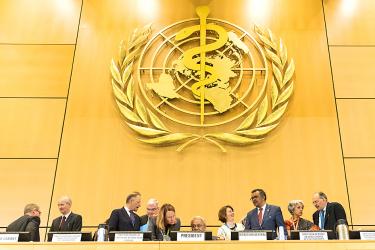The US, Japan and three other countries have added their support for Taiwan’s inclusion in the WHO at an ongoing meeting of the world body’s executive board in Geneva, Switzerland.
US Department of Health and Human Services Office of Global Affairs Deputy Director Colin McIff on Monday urged the WHO during the meeting to allow Taiwan to participate in relevant technical activities.
“As the WHO leads the global response to health emergency, including the ongoing outbreak of Ebola in the Democratic Republic of [the] Congo, it is critical that the organization be able to engage the technical expertise and financial resources from all interested parties,” McIff said.
The US was pleased when Taiwan offered to contribute US$1 million to combat Ebola last year, but was disappointed that the WHO has not found a way to accept the contribution, McIff said.
The government last month suspended the donation it pledged in May last year, after the WHO convention secretariat was unable to credit Taiwan in a way that it would find acceptable due to “political factors.”
The “participation of Taiwan in relevant technical work of WHO is beneficial to all,” McIff said.
Supporting Taiwan in an indirect manner, Japanese Ministry of Health, Labor and Welfare Senior Coordinator for Global Health Hiroyuki Hori called on the WHO to refrain from leaving anyone behind.
“As the world has become more globalized and the threat of infectious diseases that may spread beyond borders has become increasing, we assume that we should not make a geographical blank by leaving a specific region behind,” Hori told the meeting.
Meanwhile, three of Taiwan’s diplomatic allies also advocated for Taiwan’s cause at the meeting, despite the nation’s decision not to push for a formal proposal advocating for its inclusion in the WHO at this year’s meeting.
Solomon Islands Ambassador to the UN Barrett Salato told members of the executive board that millions of people in Taiwan could be vulnerable in the event of an outbreak, which could pose threats to people from other nations.
“Taiwan is a willing partner... We urge the WHO to invite Taiwan to participate meaningfully in all WHO meetings and programs in order to share its technical expertise and experience in global health emergency and humanitarian efforts,” Salato said.
Guatemala’s representative thanked Taiwan for expanding its cooperation with his country on healthcare and medicine accessibility for pregnant women, while Nicaragua’s representative said that the absence of representation for Taiwan’s 23 million people in the WHO could cause a vulnerability in the global health network.
Their support followed similar gestures by Taiwan’s diplomatic allies Eswatini, Haiti and Paraguay at an executive board meeting on Saturday.
Taiwan was able to attend the annual World Health Assembly as an observer from 2009 to 2016, when cross-strait relations were more amicable, but it has not received an invitation for two consecutive years.
Source: Taipei Times - 2019/01/30





















